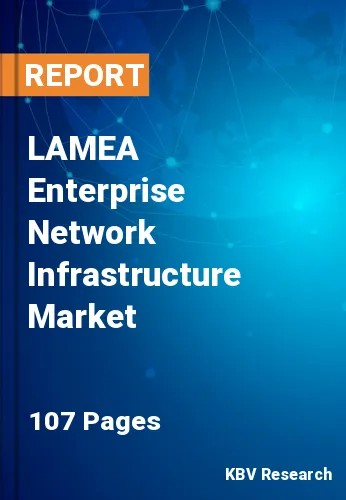
The Latin America, Middle East and Africa Enterprise Network Infrastructure Market would witness market growth of 7.9% CAGR during the forecast period (2022-2028).
For many years, the primary goal of enterprise networks was to connect everyone and everything to on-premise, self-hosted centralized data centers, where data was stored and applications were run. This was accomplished by connecting devices and users to the corporate office's LAN. A big company WAN connected each office's LAN to the other offices, which was usually built using dedicated multiprotocol label switching routes. Physical appliances were used to connect enterprise networking equipment to one other, as well as to personal PCs, printers, and IoT devices, using a combination of WIFI signals and Ethernet cables.
Employees are increasingly connecting to the network both outside and inside the office. They can connect to both the cloud as well as on data centers or only the cloud. Because the network becomes a barrier for data going to and from the cloud, centralized networking architecture becomes inefficient. Furthermore, many of these hardware appliances are now available as virtualized cloud services or as software. Using hardware-based infrastructure to scale a network necessitates the purchase and activation of additional hardware. However, instead of requiring vendor-specific hardware, growing a network utilizing software-based infrastructure (such as an SD-WAN) is conceivable. Scaling up cloud infrastructure is as easy as acquiring additional services from the cloud vendor.
The UAE is a competitive market for the Information Communication Technology (ICT) industry since it is a major hub for international trade and business in the MENA region. The Abu Dhabi Economic Vision 2030 and the UAE Vision 2021 government programs set out to construct a competitive knowledge economy as well as establish an open, effective, efficient, and internationally integrated business environment in order to reduce reliance on oil revenue and increase the private sector. The UAE government is taking a number of initiatives and efforts to help the knowledge economy grow. The UAE's technology sector continues to expand. Both the private and governmental sectors are attempting to modernize by implementing cutting-edge solutions in order to comply with the wor wave of innovation, digital transformation, data utilization, and technical improvement. The government has put aside considerable portions of the budget to realize the ambitious Vision 2021, UAE AI Vision 2031, and Abu Dhabi Vision 2031 objectives, and the drive to diversify and grow a knowledge economy is providing new opportunities. Technology companies continue to regard the UAE as a promising market for expansion.
The Brazil market dominated the LAMEA Enterprise Network Infrastructure Market by Country in 2021, and would continue to be a dominant market till 2028; thereby, achieving a market value of $1,552.8 million by 2028. The Argentina market is estimated to grow at a CAGR of 8.5% during (2022 - 2028). Additionally, The UAE market would witness a CAGR of 7.6% during (2022 - 2028).
Based on Enterprise Size, the market is segmented into Large Enterprises and Small & Medium Enterprises. Based on Industry, the market is segmented into BFSI, Government & Defense, Manufacturing, Telecom & IT, Retail & Ecommerce, Healthcare & Life Sciences, and Others. Based on Technology, the market is segmented into Routers & Switches, Enterprise Telephony, Wireless LAN, Storage Area Network, and Infrastructure Firewalls. Based on countries, the market is segmented into Brazil, Argentina, UAE, Saudi Arabia, South Africa, Nigeria, and Rest of LAMEA.
Free Valuable Insights: The Global Enterprise Network Infrastructure Market is Predict to reach $78.5 Billion by 2028, at a CAGR of 6.6%
The market research report covers the analysis of key stake holders of the market. Key companies profiled in the report include Cisco Systems, Inc., Hewlett-Packard Enterprise Company, Huawei Technologies Co., Ltd. (Huawei Investment & Holding Co., Ltd.), Juniper Networks, Inc., Broadcom, Inc. (Brocade Communications Systems, Inc.), Alcatel-Lucent Enterprise (China Huaxin Post and Telecom Technologies Co., Limited), Nokia Corporation, Avaya, Inc. (Avaya Holdings Corp.), and ZTE Corporation.
By Enterprise Size
By Industry
By Technology
By Country
Our team of dedicated experts can provide you with attractive expansion opportunities for your business.
